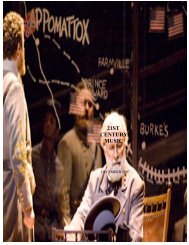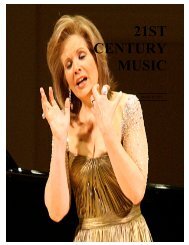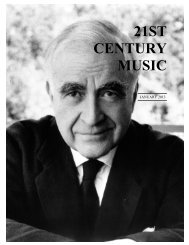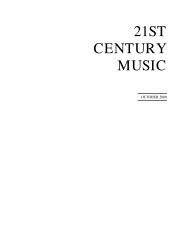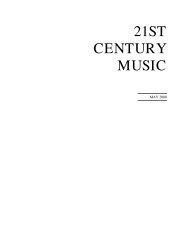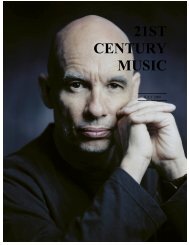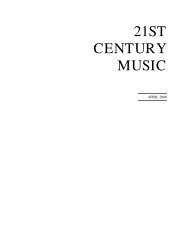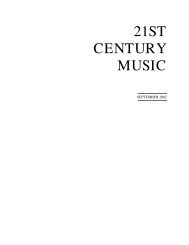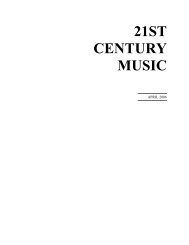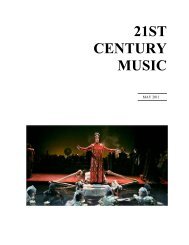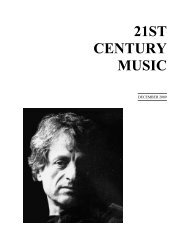You also want an ePaper? Increase the reach of your titles
YUMPU automatically turns print PDFs into web optimized ePapers that Google loves.
June 16's concert was given over to choral music, with many<br />
recent works scattered among traditional American shape-note<br />
numbers and pieces from Balkan and Georgian folk idioms.<br />
Zeke Hecker's Turtle Sings an Egg Song and Grandpa Bear’s<br />
Lullaby are eerie cradle tunes, harmonically sophisticated and<br />
most effective. Four Shakespeare Songs, by Paul Brust,<br />
tellingly explores a wide variety of moods, ranging from<br />
bouncy to warm, joyous to deliberate -- and all are splendidly<br />
written for its singers. Doncaster's fine Irish Hymn setting is<br />
like the proverbial swimming swan: one notes the smoothly<br />
sailing exterior, not the crafty mechanism that drives it.<br />
Fussell’s two pieces from his Pioneer Songbook are sensitive,<br />
heartfelt entities that go down like finely aged scotch. And<br />
Donald Martino’s early “The Lion. The Tiger” from the Bad<br />
Child’s Book of Beasts presents its charmingly ironic poem<br />
perfectly, indulging in a stretto-like combination of its two<br />
primary ideas at work's end.<br />
Performances were nearly all first-rate. From the rich trove of<br />
efforts here, one can cite Jacqueline LeClair's stunning oboe<br />
playing (featuring a huge tone and sparkling technique) in the<br />
Concertino, Susan Hampton's, and Robert Schultz's riveting<br />
presentation of Garasha, Marshall Urban’s huge and splendid<br />
baritone voice in the Ruehr and Barber's Despite and Still,<br />
cellist Darry Dolezal's thoughtful yet passionate playing in the<br />
Thomas, Julie Hanson Geist's sensitive soprano singing in<br />
Incarnations and Goethe Lieder, Matthew Doherty’s durable<br />
and flexible fluting in Memo 4, Sandra Hebert’s marvelously<br />
understated pianism (quite different from her usual outsized<br />
playing style) in Copland's Three Piano Excerpts from “Our<br />
Town,” and the Arcadian Winds' bouncy, effervescent<br />
rendition of György Ligeti's Six Bagatelles. David Hoose’s<br />
conducting on Cloud Collar, Concertino, and Goethe Lieder<br />
was terrific, ideally balancing tightness and sensitivity. Village<br />
Harmony, a Vermont-based, adolescent-aged choral group<br />
(whose members also dance and play instruments), was<br />
marvelous. Led by Larry Gordon, this well-drilled ensemble<br />
boasts a big, hearty sound; poised and polished, they’re<br />
capable of much warmth and sensitivity but effectively impart<br />
an authentic and appealing rawness to the more rustic folk<br />
numbers.<br />
The chamber qualities of Stravinsky's last major neoclassic<br />
work, The Rake's Progress, perfectly suit the moderate<br />
intimacy of the Wheeler Opera House, beautifully restored in<br />
what is by some measures America's most affluent<br />
community. Like the modest-appearing, multi-million-dollar<br />
pseudo-, neo- and amplified-restored Victorian homes that dot<br />
the tree-lined grid of Aspen's West End, the opera is in its<br />
place: careful, orderly, presentable, piquant, retrograde and not<br />
without some charm. But alive Yes! -- thanks be to the<br />
infusion of the youthful talent and energy of the imported<br />
Aspen <strong>Music</strong> Festival personnel who altogether exceeded the<br />
achievement of the San Francisco Opera's revival in June.<br />
Of the principal characters, only Eric Lodal's Nick paled by<br />
comparison to his San Francisco counterpart, superstar Bryn<br />
Terfel. Michael Slattery's Tom, on the other hand, greatly<br />
surpassed Raymond Very's fine performance in San Francisco,<br />
especially in his ability to characterize effortless, wide-eyed<br />
indolence. If Slattery's voice hadn't been so endearing, this<br />
reviewer would have been fooled into shouting "Stop<br />
smirking; get off your duff, and get a JOB!"<br />
Costumes were done in contemporary style, with Tom's<br />
clothes appropriately becoming darker as his sins<br />
accumulated. The demonic Nick Shadow wore a wonderful<br />
suit with iridescent, flame-red highlights. Sets, while not up to<br />
David Hockney's conceit of magnified engravings, were<br />
serviceable and effective, helping to put focus on the human<br />
actions in the morality play rather than stealing the show at the<br />
characters' expense, as Hockney's seemed to do. As an in-joke<br />
for the present economy, the bread-making machine in the<br />
Aspen production was depicted by a PC, with a floppy as an<br />
input rather than a stone. Does this imply that the IPO craze<br />
in Silicon Valley is in for hard times<br />
In short, a commendable effort!<br />
The Aspen Festival's Progress<br />
JEFF DUNN<br />
Aspen Opera Theater Center presents Igor Stravinsky's The<br />
Rake's Progress, with Michael Slattery (Tom), Kerri Marcinko<br />
(Anne), Eric Lodal (Nick), and Judith Ann Metzger (Baba),<br />
directed by Edward Berkeley, conducted by Alan Gilbert.<br />
July 13, Wheeler Opera House, Aspen, CO.<br />
29



